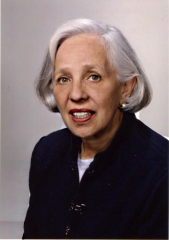|
|
|
|
|
|
|
News & Views item - August 2009 |
![]() President Emeritus of the Carnegie Institution of Washington Champions Great
Teachers for STEM. (August 28, 2009)
President Emeritus of the Carnegie Institution of Washington Champions Great
Teachers for STEM. (August 28, 2009)
Maxine Singer obtained her PhD from Yale University in 1957 in biochemistry. She was chief, Laboratory of Biochemistry at the NIH's National Cancer Institute from 1980-1987. In 1988 Dr Singer was invited to become president of Carnegie Institution of Washington, a position she held until her retirement in 2002.
For today's editorial in Science Dr Singer chose to address "Great Teachers for STEM" [Science, Technology, Engineering and Mathematics]. What she has to say is equally as relevant for Australia as it is for the United States.
Some excerpts:
 Many
countries are striving to develop the human resources required to advance
science and technology. Success requires a system of education that prepares
young people for life in today's complex societies.
Many
countries are striving to develop the human resources required to advance
science and technology. Success requires a system of education that prepares
young people for life in today's complex societies.
...the quality of STEM teaching is of singular importance to the success of students, requiring "great teachers, who know the content." Herein lies a major challenge: How to develop and cultivate great STEM teachers?
U.S. schools currently fail to teach STEM effectively... Some scientists, nationwide, have for decades provided professional development in content and pedagogy to teachers of math and science, from early through secondary (precollege) education. But test data and experience indicate that, with some remarkable exceptions, even intensive professional development is a failed experiment that cannot make up for the poor quality of the teachers' own STEM educations. Many elementary school teachers studied no science or math beyond high school and may remember only that they disliked the subjects. Secondary school STEM teachers who were educated decades ago are unlikely to be familiar with modern scientific knowledge. Most troubling, many secondary school classes are taught by teachers with no STEM qualifications at all.
In order to overcome the deficiency Dr Singer proposes:
Excellent undergraduate students who are not dedicated to research should be encouraged by their science faculty to become STEM teachers [and] those who pursue advanced degrees and certification for STEM teaching should be offered fellowships.
The U.S. National Science Foundation's new Teaching Fellowships program should be expanded so that it can more widely provide funds to support tuition, stipends, and academic programs for those with undergraduate degrees in STEM subjects who commit to teaching in high-need school districts.
Scientists should work to help develop STEM teacher education programs that are rigorous and relevant for teaching students who have grown up in the Internet era.
Last but not least, STEM professionals must engage actively with precollege-level STEM teachers in a sustained way. In his memoirs, physicist and Nobel Peace Prize recipient Andrei Sakharov describes his father, a high-school physics teacher, as a physicist. STEM teachers must similarly be considered vital members of the professional scientific community.